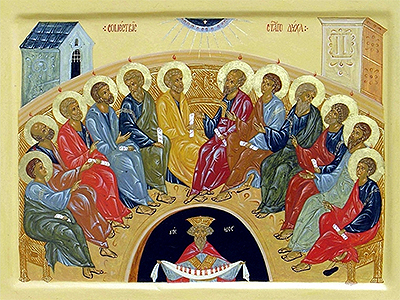Sermon on the Pentecost by Archbishop Simon (Vinogradov) of Peking and China

The day of kneeling has come. “In Thy courts, O Lord, as we the faithful bend the knee of the soul and body, we praise Thee, the beginningless Father, the co-beginningless Son, and the co-eternal and Most Holy Spirit, Who dost enlighten and sanctify our souls.”
The long kneeling prayers are exclusive to this holiday. This is the only festive day when the Church rules have us pray on our knees. What does this mean? Many might ask: we are accustomed to praying while kneeling. Much of what we do is not in accordance with Church rules, much in ancient tradition is not followed.
“Church rules,” says St Basil the Great, “teach us during these days (i.e. on Sundays and the days of Pentecost) to prefer the erect posture of the body during prayer, a clear reminder of moving our thought from the present to the future.” “For co-resurrected with Christ and needing to seek the heavenly, standing during prayer on Sunday (we) remind ourselves of the grace granted to us.” “All of Pentecost is a reminder of resurrection that we anticipate in the future age.” “During all kneeling, we show in action… that we have fallen in sin to the earth” (St Basil the Great, homily 91).
And so, for the sake of the celebration of the Resurrection of Christ, during all of the days before Pentecost, one must not kneel.
This is the last feast when we pray in boldness, without bending knee, and also first during which we kneel. With the Resurrected Christ we triumphed over death and sin. But personally each of us has not conquered sin within ourselves and we need to make that spiritual podvig, the struggle against which the Lord sent the Holy Spirit to the earth.
And so now not only in word and mind but in prayer without kneeling we confess the victory over sin and death, but as soon as Liturgy ends of the last triumphant feast day of the Church, we bend our knee with meekness, asking and expecting the grace of the Holy Spirit to help us in our struggle.
From this day, without delay we must arm ourselves with the thought of this struggle, so that when the Forty Days come again-Great Lent-we will be ready, without spiritual laziness, but with heartfelt humbleness to make the many prostrations according to the Church rule, bringing our repentance and preparing once again to celebrate Pascha, should God desire to leave us among the living until then.
And so, as we now kneel, let us ponder how the power of the grace of the Holy Spirit we will worthily, once again, present ourselves before Christ on this bright feast day of His Resurrection, making as it were one deep prostration for the entire year.
12 May/3 June 1928.
|